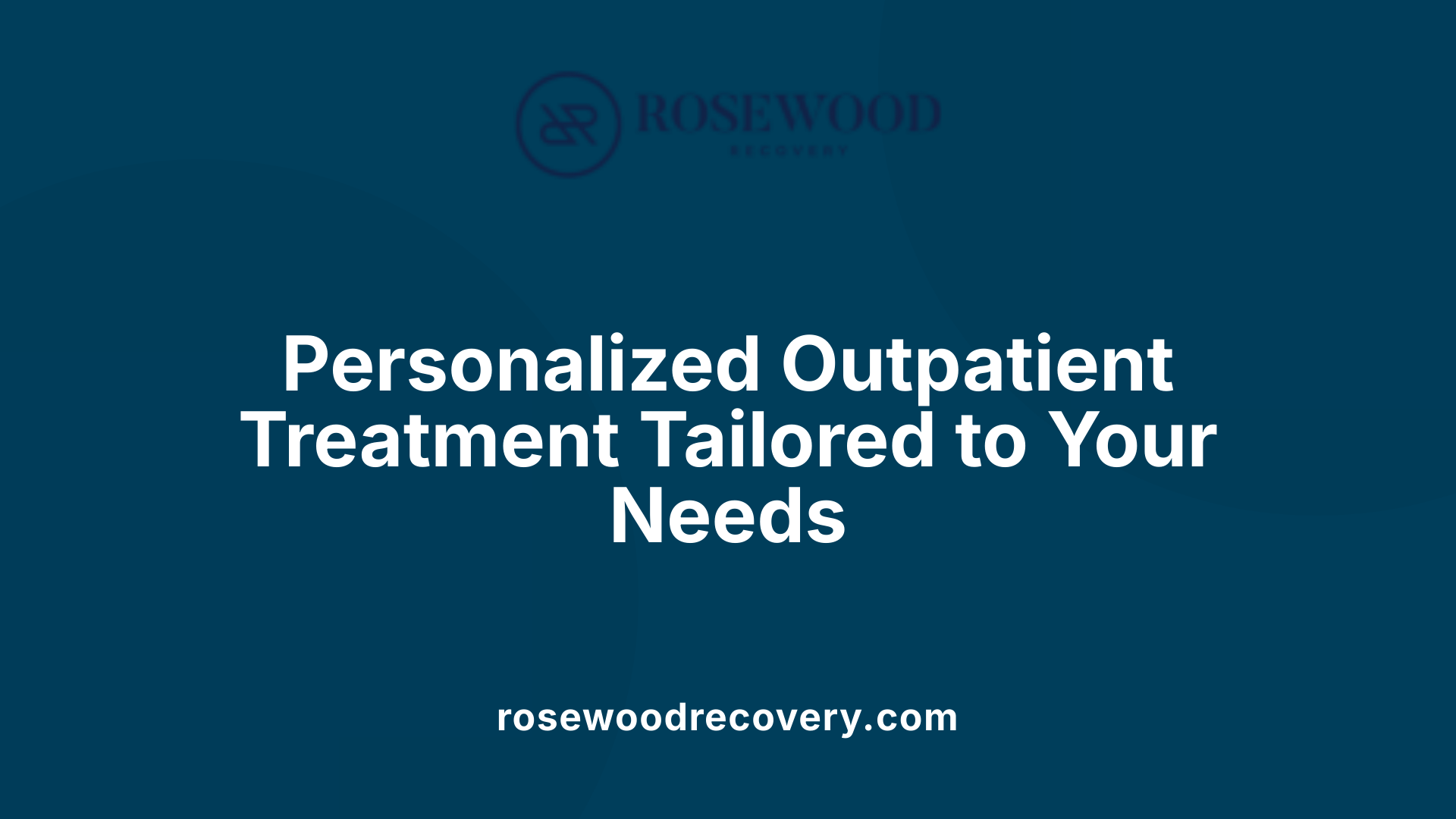Understanding the Value of Outpatient Treatment Options
Choosing the right path to recovery is a personal decision that depends on an individual's specific needs and circumstances. Outpatient addiction treatment centers have become a popular choice for many due to their flexibility, accessibility, and comprehensive support systems. This article explores the benefits, features, and considerations of outpatient programs, illustrating why they are an effective component of the continuum of care for substance use disorders.
Core Features of Outpatient Addiction Programs
What features do outpatient addiction programs typically include?
Outpatient addiction programs are designed to provide comprehensive care while allowing individuals to maintain their daily routines. These programs usually encompass various therapeutic and support services tailored to meet individual needs.
Most outpatient treatments include individual counseling sessions, where patients work one-on-one with a licensed therapist to explore personal issues, develop coping strategies, and progress toward recovery goals.
Group therapy is another fundamental component, offering participants a platform to share experiences, gain peer support, and learn from others facing similar challenges. Family therapy sessions are also commonly integrated, emphasizing family involvement to strengthen support systems, educate loved ones about addiction, and address relational dynamics.
In addition to counseling, medication-assisted treatment (MAT) is often employed, utilizing medications like methadone, buprenorphine, or naltrexone to reduce cravings, ease withdrawal symptoms, and support abstinence.
Behavioral therapies such as cognitive-behavioral therapy (CBT) and motivational interviewing are evidence-based approaches frequently used to change harmful thought patterns and enhance motivation for recovery.
Holistic approaches—including yoga, mindfulness, art therapy, or recreational activities—are increasingly incorporated to promote physical and mental well-being, reduce stress, and foster overall health.
The structure of outpatient programs varies, ranging from less intensive outpatient services to more structured options like Partial Hospitalization Programs (PHP) and Intensive Outpatient Programs (IOP). PHPs typically involve several hours of treatment per day, several days a week, while IOPs offer fewer hours but still deliver significant support.
Additional features may include case management to coordinate care, psychoeducation to inform patients about addiction and mental health, relapse prevention strategies, and ongoing assessment of co-occurring mental health conditions.
Ultimately, outpatient addiction programs aim to support recovery within the community setting, leveraging tailored therapies and support networks to foster lasting sobriety and emotional stability.
Matching Treatment Intensity with Individual Needs

Who is a good candidate for outpatient addiction treatment?
A suitable candidate for outpatient addiction treatment typically has a mild to moderate substance use disorder or co-occurring mental health issues. These individuals usually do not experience severe withdrawal symptoms that require medical detoxification, making outpatient care a safe option. They are often those who possess a strong support network, such as family or friends, and have a stable and safe living environment.
Motivation to sustain recovery, reliable transportation, and the ability to juggle daily responsibilities like work or school are also important. Many of these individuals have previously completed inpatient or residential programs, using outpatient treatment as a step-down or ongoing support.
Outpatient programs are designed to provide flexibility, allowing patients to attend structured therapy sessions during the day or evening while maintaining their routines.
Overall, candidates should be capable of engaging actively in therapy and support groups, managing personal commitments, and living in a safe environment. This suitability ensures that outpatient treatment can be both effective and sustainable for their recovery journey.
Supporting Long-Term Recovery and Lifestyle Integration
How do outpatient programs support long-term recovery?
Outpatient programs play a crucial role in sustaining recovery over the long term. They provide ongoing, structured therapy tailored to each person’s specific needs, which is essential for relapse prevention. Regular individual counseling and group therapy sessions help individuals recognize triggers, develop coping strategies, and reinforce their commitment to sobriety.
Education on addiction, mental health, and relapse prevention is a core component, empowering individuals to manage their recovery confidently. Family involvement within outpatient programs enhances the support network, helping to repair relationships and foster a collective commitment to ongoing wellness.
Community support groups like AA or NA are often integrated, offering social support and accountability outside formal treatment sessions. The flexibility of outpatient care allows participants to balance their recovery efforts with daily responsibilities such as work, school, and family life.
Healthy routines are a pillar of sustained recovery. Outpatient programs encourage the development of daily habits that promote physical and mental health, such as regular exercise, nutritious eating, and mindfulness practices. Addressing co-occurring mental health issues like anxiety and depression is also a vital aspect, often incorporated through integrated treatment plans involving therapy and medication when necessary.
Overall, outpatient programs serve as a vital bridge from intensive treatment to independent, sober living. They foster self-management, strengthen support systems, and help individuals build resilient, healthy lifestyles that last beyond formal treatment.
Financial and Accessibility Benefits of Outpatient Treatment
Outpatient addiction treatment is often more affordable and accessible compared to inpatient programs. The costs of outpatient rehab can vary based on the intensity of the services provided. For instance, Partial Hospitalization Programs (PHP) typically range from $350 to $800 per day, offering comprehensive care during daytime hours. Intensive Outpatient Programs (IOP) generally cost between $250 and $500 per session, while standard outpatient services are usually priced between $100 and $300 per session.
Over a typical three-month treatment period, total expenses often fall between $5,000 and $10,000. This is substantially lower than inpatient or residential care, which can cost tens of thousands of dollars due to lodging, 24/7 medical supervision, and other amenities.
Insurance coverage plays a crucial role in making outpatient rehab financially feasible. Most health plans, including those under the Affordable Care Act, Medicaid, and Medicare, do provide some coverage for outpatient addiction treatment. However, the extent of coverage can vary widely among providers and plans. Patients should verify with their insurance providers to understand what services are covered, including co-payments, deductibles, and annual session caps. Ensuring the chosen facility is in-network can also reduce out-of-pocket expenses.
Additionally, many programs offer financial assistance options such as sliding scale fees, grants, scholarships, and flexible payment plans. These resources are especially beneficial for individuals without insurance or those with limited coverage. Some centers also help arrange payment plans that spread costs over time, easing financial burdens.
Ultimately, outpatient rehab offers a cost-effective alternative to inpatient care, with the added advantage of greater flexibility. By leveraging insurance benefits and financial aid options, many individuals can access quality treatment without significant financial strain. To explore options, searching terms like "Outpatient rehab costs insurance coverage financial aid" can provide helpful resources and further guidance.
The Role of Evidence-Based Therapies and Medications

What types of outpatient addiction treatment services are available?
Outpatient addiction treatment services offer a variety of therapeutic and supportive options that enable individuals to work towards recovery while living at home. These services include individual counseling, group therapy sessions, family involvement, psychoeducation, and medication-assisted treatment (MAT).
Therapies like Cognitive Behavioral Therapy (CBT), motivational interviewing, and holistic approaches such as mindfulness and wellness activities are commonly used to address addiction’s psychological components. MAT combines medications such as buprenorphine, methadone, or naltrexone with counseling to reduce cravings and withdrawal symptoms, enhancing the chance of sustained recovery.
Treatment levels range from standard outpatient programs requiring fewer hours weekly to intensive outpatient programs (IOPs) and partial hospitalization programs (PHPs), which involve more frequent and structured sessions. These options are often tailored to individual needs, promoting flexibility and accessibility.
Many centers also provide specialized services for populations like women, individuals with co-occurring mental health disorders, or those involved in the criminal justice system. Support services such as case management, peer groups, and relapse prevention strategies form an integral part of outpatient care.
In summary, outpatient services encompass a comprehensive array of therapies, medications, and support systems designed to treat substance use and mental health issues effectively, all while allowing patients to maintain their daily routines.
Community Integration and Support System Engagement
 Support systems are essential in outpatient addiction treatment, providing a network of assistance that promotes sustained recovery. This comprehensive approach involves a multidisciplinary team of healthcare professionals, including therapists, doctors, and addiction specialists, who deliver behavioral counseling, therapy sessions, medication management, and evaluations for co-occurring mental health conditions.
Support systems are essential in outpatient addiction treatment, providing a network of assistance that promotes sustained recovery. This comprehensive approach involves a multidisciplinary team of healthcare professionals, including therapists, doctors, and addiction specialists, who deliver behavioral counseling, therapy sessions, medication management, and evaluations for co-occurring mental health conditions.
Family involvement is a cornerstone of outpatient care. Family therapy sessions aim to educate loved ones about addiction, facilitate open communication, and strengthen the support system at home. Engaging families in the recovery process helps create a nurturing environment that encourages positive changes.
Peer support groups like Alcoholics Anonymous (AA) and Narcotics Anonymous (NA) are integral community resources. These groups offer a sense of camaraderie, shared experience, and encouragement, which can significantly improve long-term sobriety. Regular participation in such groups helps individuals develop coping skills and resilience against relapse.
Community resources extend beyond therapy and support groups. Many local programs provide additional services such as sober living facilities, social services, vocational training, and recreational activities. These resources help reinforce lifestyle changes, foster social connections, and promote independence.
Flexibility in support delivery methods, including in-person sessions and telehealth options, ensures that individuals receive consistent care regardless of their schedules or mobility. This adaptable framework makes outpatient treatment highly accessible and tailored to each person's unique circumstances.
Altogether, integrating family, peer networks, and community resources creates a robust support system that sustains recovery efforts beyond initial treatment, helping individuals build a healthier, more stable life.
Navigating the Path to Sustainable Sobriety
Choosing outpatient addiction treatment centers offers numerous advantages, including greater flexibility, ongoing support, community integration, and often lower costs. These programs enable individuals to maintain their daily routines while receiving professional care tailored to their needs. With the inclusion of evidence-based therapies, medications, and family involvement, outpatient treatment not only addresses immediate recovery needs but also fosters long-term sobriety. As part of the continuum of care, outpatient programs are a vital resource for individuals seeking a sustainable and manageable path to a healthier, addiction-free life.
References
- National Helpline for Mental Health, Drug, Alcohol Issues - SAMHSA
- Substance Abuse Intensive Outpatient Programs: Assessing the ...
- Inpatient vs. Outpatient: Drug, Alcohol and Mental Health Rehab
- Summary of Evidence - Inpatient and Outpatient Treatment ... - NCBI
- Benefits of the Outpatient Drug Rehab Program
- Who Benefits from Outpatient Programs and Who Needs Intensive ...
- The Benefits Of Outpatient Rehab - Alcohol Help
- Outpatient Rehab for Drugs & Alcohol Near You
- 5 Benefits of Residential Treatment | Addiction Treatment | TX



.jpeg)
